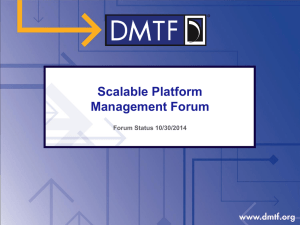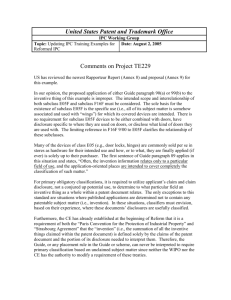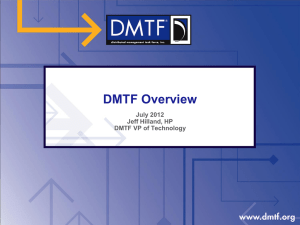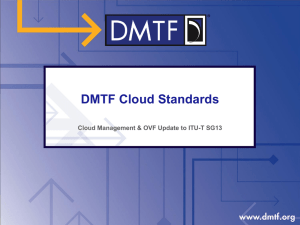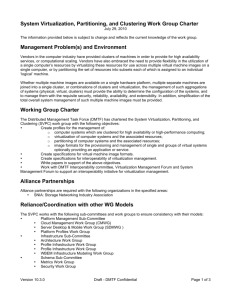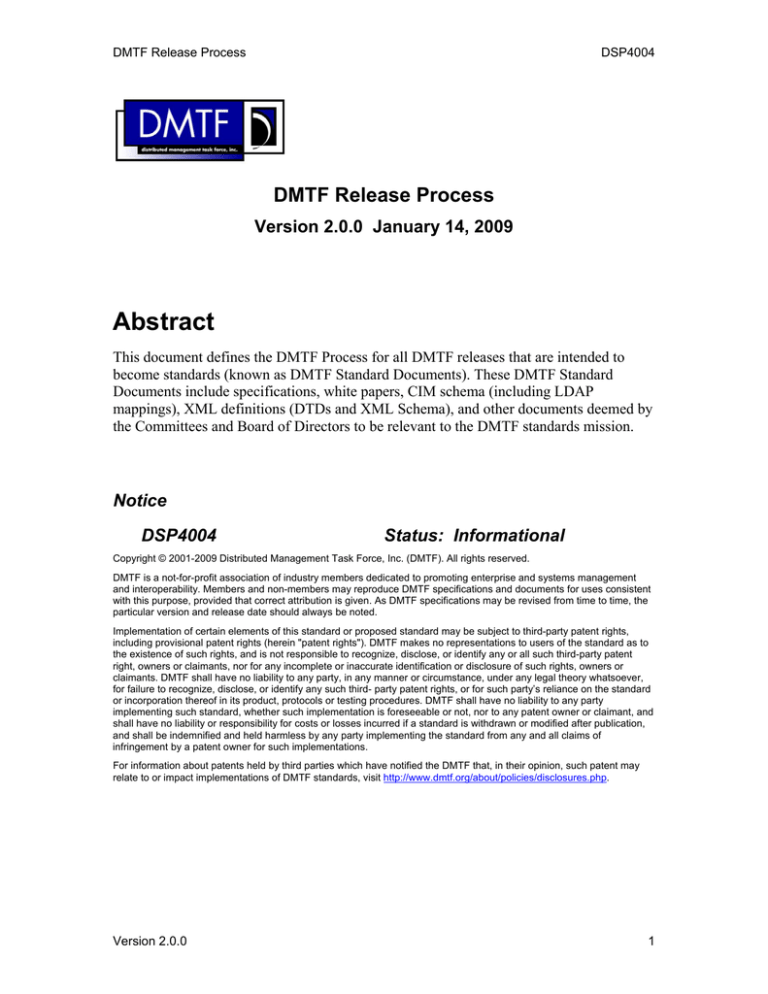
DMTF Release Process
DSP4004
DMTF Release Process
Version 2.0.0 January 14, 2009
Abstract
This document defines the DMTF Process for all DMTF releases that are intended to
become standards (known as DMTF Standard Documents). These DMTF Standard
Documents include specifications, white papers, CIM schema (including LDAP
mappings), XML definitions (DTDs and XML Schema), and other documents deemed by
the Committees and Board of Directors to be relevant to the DMTF standards mission.
Notice
DSP4004
Status: Informational
Copyright © 2001-2009 Distributed Management Task Force, Inc. (DMTF). All rights reserved.
DMTF is a not-for-profit association of industry members dedicated to promoting enterprise and systems management
and interoperability. Members and non-members may reproduce DMTF specifications and documents for uses consistent
with this purpose, provided that correct attribution is given. As DMTF specifications may be revised from time to time, the
particular version and release date should always be noted.
Implementation of certain elements of this standard or proposed standard may be subject to third-party patent rights,
including provisional patent rights (herein "patent rights"). DMTF makes no representations to users of the standard as to
the existence of such rights, and is not responsible to recognize, disclose, or identify any or all such third-party patent
right, owners or claimants, nor for any incomplete or inaccurate identification or disclosure of such rights, owners or
claimants. DMTF shall have no liability to any party, in any manner or circumstance, under any legal theory whatsoever,
for failure to recognize, disclose, or identify any such third- party patent rights, or for such party’s reliance on the standard
or incorporation thereof in its product, protocols or testing procedures. DMTF shall have no liability to any party
implementing such standard, whether such implementation is foreseeable or not, nor to any patent owner or claimant, and
shall have no liability or responsibility for costs or losses incurred if a standard is withdrawn or modified after publication,
and shall be indemnified and held harmless by any party implementing the standard from any and all claims of
infringement by a patent owner for such implementations.
For information about patents held by third parties which have notified the DMTF that, in their opinion, such patent may
relate to or impact implementations of DMTF standards, visit http://www.dmtf.org/about/policies/disclosures.php.
Version 2.0.0
1
DMTF Release Process
DSP4004
Table of Contents
DMTF Release Process .................................................................................................................................. 1
Abstract .......................................................................................................................................................... 1
1 DMTF Release Process .......................................................................................................................... 3
1.1
Obtain DSP Number....................................................................................................................... 4
1.2
DMTF Document States................................................................................................................. 4
1.2.1
In Development ...................................................................................................................... 4
1.2.2
Work in Progress .................................................................................................................... 4
1.2.3
Member Review ..................................................................................................................... 5
1.2.4
DMTF Standard...................................................................................................................... 7
1.2.5
Informational .......................................................................................................................... 7
1.3
Availability of Document Versions and Obsolescence................................................................... 8
1.4
Review Phases ................................................................................................................................ 8
2 Numbering, Versioning and Cover Material for DMTF Documents.................................................... 10
2.1
Cover Material for DMTF Documents ......................................................................................... 10
2.1.1
DMTF Documents................................................................................................................ 10
2.1.2
DMTF Schema ..................................................................................................................... 11
2.2
Specification, White Paper, and Document Numbering Process.................................................. 12
2.3
Schema Numbering Process ......................................................................................................... 12
2.4
Versioning the CIM Infrastructure Specification ......................................................................... 13
3 Accepted Formats ................................................................................................................................. 14
Appendix A – Change History ..................................................................................................................... 15
Version 2.0.0
2
DMTF Release Process
DSP4004
1 DMTF Release Process
The phases in the release process of a DMTF Standard are:
1. Obtain a DSP number
2. In Development
3. Work in Progress
4. Member Review
5. DMTF Standard
The phases in the release process of a DMTF Document which is not a DMTF Standard
are:
1. Obtain a DSP number
2. In Development
3. Informational
Examples of DMTF Standards include profiles, mapping specifications, standard
registries, standard schema definitions, wrapper specifications and assorted WBEM
specifications.
In addition to DMTF Standards, a Committee may release white papers, process
documents or technical notes that provide supplemental content on the work produced by
the Committee (which is restricted by charter). These documents are released with a
status of Informational. Collectively, we will refer to these documents and DMTF
Standards as “Documents” (with an upper case).
As DMTF Standards progress through the DMTF Release Process, their status, as
documented in the document, changes from In Development, to Draft Standard, and
finally to Standard. This process applies to all DMTF Standard Documents.
Every DMTF Document must have its date, status and version on the cover page, as well
as the required DMTF copyright notice and disclaimers. See section 2.1 for versioning
requirements. In addition, Work in Progress documents must contain the expiration date
on the cover page.
The CIM standard is specified in Management Object Format (MOF). A DMTF CIM
Schema consists of MOF files, UML diagrams, white papers, and other supporting
documentation (for example, supporting examples). The contents of the MOF files and
the documentation are updated as they progress through the DMTF Release Process.
DMTF documents are developed collaboratively by Working Groups, then reviewed and
approved through the organization. Acceptable formats for DMTF artifacts have been
defined because the software used across member company organizations for document
review and editing varies. Items submitted to the DMTF must be in an acceptable format,
as described in section 3. Items submitted to the DMTF after July 1, 2004 must use this
format.
Version 2.0.0
3
DMTF Release Process
DSP4004
Proposals or rough drafts for new, additions to or changes to any type of DMTF Standard
Document, including updates, are made available to the originating Working Groups by
posting this information to the Working Groups’ Web page(s). Additions and changes to
DMTF Standard Documents must be described using the standard DMTF Change
Request. Procedures defining the use of the DMTF Change Request (CR) are provided in
DSP4002. If the proposal is written in collaboration with another standards body, it may
also be posted to the membership of that standards body, using the guidelines of that
standards body.
1.1 Obtain DSP Number
The first step of the process is for the Subcomittee, Forum or Working Group to obtain
editorial responsibility of the document. In the case of new works, this means acquiring a
DSP number. In the case of prior works, this means acquiring editorial responsibility of
the appropriate document, in whole or in part. For the CIM Schema, this is decided
according to Sub Committee, Forum and/or Working Group charter and the section of the
MOF being modified. Changes are requested through the CR process described in
Section 3. For Profiles, this must be done in accordance with the policies and procedures
documented in DSP4005. For all other documents, this must be done in accordance with
the policies and procedures documented in DSP4007.
1.2 DMTF Document States
The following section includes the DMTF Document States and the procedures required
to transition a document along the development process.
1.2.1 In Development
When a Body is in the progress of editing and developing a document, the document
should be marked “In Development” to clearly delineate the approval phase that this
document is in. The document should be clearly marked DMTF Confidential and contain
any required copyright and other notices.
1.2.2 Work in Progress
A Body that has Editorial Responsibility (Editing Body) for a document may vote to
release a Work In Progress for review to one or more recipients, including the general
DMTF membership, an Alliance Partner organization, or the general public. All such
documents must be within the Working Group’s charter scope and be clearly marked as
“Work In Progress” on every page. All such documents must contain a DSP number, all
DMTF copyright notices and required disclaimers including a notice that they are subject
to change and their expiration date. A DMTF Standard shared as a Work in Progress
must have version numbering which identifies the target version for release as a Standard,
as specified in Section 2.2.
In order for a document to be released as a Work In Progress outside of the Editing Body,
and shared with one or more recipients, the Editing Body must vote to approve the
release. Once approved by the Editing Body, the proposed Work In Progress document
Version 2.0.0
4
DMTF Release Process
DSP4004
will proceed to the Parent Committee, bypassing any Parent Subcommittee. The Parent
Committee must approve all DMTF Work In Progress Documents before they are
released to ensure that it is within the Working Group’s chartered scope. The submission
to the Parent Committee will follow the standard CR approval process. The
accompanying CR must explicitly identify the intended recipients and the requested
expiration date. Any required material to reproduce the document (such as drawings)
must be checked into CVS.
All Work In Progress documents approved by the Parent Committee must contain an
expiration date which can be one to six months from the date of approval by the Parent
Committee. After the expiration date has been reached, the Parent Committee is
responsible for ensuring the document is no longer shared with the recipients. Prior to
expiration of the document the originating Editing Body may submit a CR requesting the
expiration period to be extended. If a CR is submitted, the Parent Committee will review
status and specification development activity, and decide whether to extend Work In
Progress status. If no request is made, the default is for the document to be withdrawn
upon expiration. The sharing of a Work In Progress, including extensions, must not
exceed six months from the date of approval by the Parent Committee.
Note that any feedback from Alliance Partner organizations, the general public or
company or individual who is not a member of the DMTF will only be accepted through
the DMTF Feedback Portal to ensure that DMTF will have the copyright to the material
and that the feedback will be in adherence to the DMTF Patent Policy.
After the Parent Committee has approved sharing a Work in Progress document, the
owning Editing Body may desire to have the document withdrawn prior to the agreed
upon expiration date. The Editing Body may submit a CR requesting to have the
document withdrawn.
When the Working Group considers the Work in Progress ready to move to the Standard
phase, the proposals are released to the Parent Committee for approval using the process
documented in Sections 1.2.3 & 1.2.4.
1.2.3 Member Review
An Editing Body may vote to release a Standard Document as a candidate for Standard
by changing the document status to “Draft Standard” and following the processes in this
section. All such documents must be within the Editing Body’s charter scope and be
clearly marked as “Draft Standard” on every page. All such documents must contain a
DSP number, all DMTF copyright notices and required disclaimers including a notice
that they are subject to change. All normative references in the specification must be
published before the specification can move forward, or they must be released
simultaneously in the case of interdependent documents. All normative references shall
be published and references shall be persistent (that is, they should be published in a
location that will not change over time).
The Parent Subcommittee (if any) must approve all DMTF Draft Standard Documents
before they proceed to the Parent Committee for approval, in accordance with the
Committee Voting Process. After the Parent Subcommittee approves the document, it
Version 2.0.0
5
DMTF Release Process
DSP4004
and any required material to reproduce the document (such as drawings) must be checked
into CVS.
Before the Parent Committee approves the document, it is sent to the DMTF Membership
by the Chair of the Parent Committee along with a notice asking for claims of essential
patent rights. DMTF Member comment is invited during the Member Review phase. The
DMTF Membership review comment & claim period closes thirty (30) days after the
notification is sent to the DMTF Membership. This period is also known as “DMTF
Member Review”. Note that the Parent Committee does not vote on the approval of the
document until the end of the DMTF Member Review period.
Comments, questions, and feedback on the Draft Standard will be addressed by the
Editing Body. Feedback may generate changes to the Draft Standard, which must be
approved by the Editing Body. Any changes will appear in a new version of the Draft
Standard. This new Draft Standard must be approved by any Parent Subcommittee
before the document proceeds to the “Standard” Approval Phase (See Section 1.2.4).
The Parent Subcommittee, as part of the comment resolution process, shall determine if
an additional DMTF Member Review is needed. (This may be needed in the case where
comments result in additional text which warrants an additional call for essential patent
rights.)
If no comments or claims are received, the document proceeds directly to the “Standard”
Approval Phase (see Section 1.2.4)
1.2.3.1 CIM Schema
In the case of CIM Schemas, individual Working Groups or Subcommittees create the
Change Request to take the Schema to the Standard phase (via a CR to remove the
“Experimental” qualifier) or to add to the next Experimental Standard release. All such
Change Requests must be approved by the owning Working Group or Subcommittee
chartered with ownership of that part of the schema. At the discretion of the Working
Group or Subcommittee owning that part of the schema, parts of a schema may be
removed. CIM Schema and their changes do not have DSPs and do not follow the DSP
acquisition and release process.
For DMTF CIM Schema to reach the Standard status it must contain one or more
Managed Object Format (MOF) files and UML diagrams that are provided in an
acceptable format, as described in Section 3. The MOF files must not contain any
elements that are qualified as Experimental. A white paper or profile should also be
released that includes a description of the circumstances under which the classes can be
sub-classed, the expected usage of the classes, and at least two sample use cases. For a
change to the CIM schema to remove the Experimental qualifier, implementation
experience from two independent implementations is required by a minimum of two
companies that must be members of DMTF or an alliance partner. Implementation
experience within an alliance partner organization may be substituted with approval of
the Parent Committee if the CIM schema changes are representative of the model
developed by the external organization. For example, if an IETF MIB is modeled in CIM,
implementation experience for the MIB may be used to make the CIM changes to remove
the Experimental qualifier.
Version 2.0.0
6
DMTF Release Process
DSP4004
Implementation experience for the schema includes using the server for experimental
elements in prototypes, internal systems, or product development. Implementation
experience does not have to be restricted to released products to be applicable. The goal
is to validate that schema additions and changes can be implemented and are complete.
1.2.4 DMTF Standard
Once the DMTF Member Review has been completed and any changes have been
approved by the Editing Body and any Parent Subcommittee, the Parent Committee may
vote to release a DMTF Standard Document as “Standard” for release to the general
public. All such documents must be clearly marked as “Standard” on every page prior to
ballot at the Parent Committee. All such documents must contain a DSP number, all
DMTF copyright notices and required disclaimers including a notice and must not
contain an expiration date. All normative references in the specification must be
published before the specification can move forward, or they must be released
simultaneously in the case of interdependent documents. All normative references shall
be published and references shall be persistent (that is, they should be published in a
location that will not change over time). Any DMTF Confidentiality statements must be
removed.
The Parent Committee must approve any DMTF Standard Document as a Standard in
accordance with the Committee Voting Rules before it can be brought to the DMTF
Board for approval. The DMTF Board must also approve the public release of all
versions and releases of the DMTF Standards, in accordance with the DMTF Board
Voting Rules.
Corrections to a Standard must be handled as Errata. Errata are released using the same
process defined in Sections 1.2.3 & 1.2.4.
1.2.5 Informational
Documents marked as Informational consist of presentations, white papers, process
documents or any other non-DMTF Standard Document. DMTF Standards Documents
must not be marked as Informational. Informational documents may not be marked Draft
Standard or Standard. Presentations and White Papers may be released with only
Committee approval and do not require DMTF Board approval. All such documents
must be within the Editing Body’s charter scope and be clearly marked as
“Informational” on every page. All White Papers must contain a DSP number. All
documents must contain all DMTF copyright notices, required disclaimers including a
notice that they are subject to change and an expiration date.
Documents marked as Informational follow a different shorter process than DMTF
Standard documents since DMTF Member Review is not performed. They must go
through the DSP acquisition phase but do not go through Draft Standard and Standard
phases described in Sections 1.2.3 & 1.2.4. Instead, they must be approved by the
Editing Body, and Parent Subcommittee, checked into CVS and approved by the Parent
Committee. If the document is a Process document, it must also be approved by the
Board. Informational documents other than process documents shall not require approval
by the board. After completion of this process, the document may be published.
Version 2.0.0
7
DMTF Release Process
DSP4004
1.3 Availability of Document Versions and Obsolescence
The Publication of all Committee and Board Approved specifications (but not white
papers, process documents, schema or presentations) is the prerogative of the Marketing
Committee. This is intended to time publication with any press release material. When
the Board approves any document for release, the Marketing Committee must establish
the release date for the document if the publication is to be delayed. If no delay is
requested, then publication is assumed to be immediate.
The release of a new version of a specification, white paper, or document does not make
previous versions obsolete. Versions become obsolete when the market no longer
requires them. The underlying goal is upward compatibility between versions. This goal
should be approached with caution because maintaining upward compatibility between
versions may not always be possible.
Updates to a specification, white paper, or document are submitted to the Editing Body.
Each specification must contain a change history. (For graphical documents, such as
UML diagrams, that are not conducive to including a change history, this history is
repeated in the MOF file.) The status of these documents must be indicated as “Work In
Progress,” “Informational”, “Draft Standard,” or “Standard.” A change log and
completed Change Request forms must be maintained for all specifications, white papers,
and documents.
For a given version of a DMTF Standard, at most one revision may be shared as a Work
in Progress, released as a Draft Standard, or released as a Standard for any given version
number. For example, it is not permissible for version 1.0.0f of a document to be shared
outside of DMTF Working Groups as a Work in Progress simultaneous with the released
of version 1.0.0 as a Standard. Nor is it permissible for version 1.0.0a and 1.0.0b of a
document to be released as a Work In Progress simultaneously. It is possible to have
version 2.0.0 of a Standard specification published at the same time as version 1.6.2 of a
Standard specification, as well as both 1.6.2 and 1.7.0.
Specifications and other documents that have reached a level of maturity where they are
no longer actively being updated should be posted to a section of the website dedicated to
“historical” documents. The website must contain information indicating that this
specification is still relevant to the industry but new versions should not be expected.
Specifications that are greater than 5 years old and are Standard should be moved to this
portion of the website but the URL to the document should not change. Previous
versions of the CIM Schema that are greater than two years old fall into the “historical”
category and should be treated appropriately. Note that the URI of the document should
remain persistent (remain the same over time) to allow other specifications to reference
DMTF Standards.
1.4 Review Phases
The length and posting of each phase varies as shown in the following table:
Phase
Length of Phase
Status
WEB Posting
Request for
Indeterminate
N/A
N/A
Version 2.0.0
8
DMTF Release Process
DSP
Working
Group
Work in
Progress
(Optional)
DMTF Draft
Standard
DMTF
Standard
DMTF
Standard
DMTF
Informational
DSP4004
Indeterminate
In Development
Not more than six
months (See Note.)
Work in
Progress
Not less than 30
days
Less than five years
Draft Standard
Greater than five
years
Indeterminate
Standard
Standard
Informational
DMTF Internal Web Site Working Group Web Page
DMTF Public Web Site –
Work-in-Progress Page
DMTF Internal Web Site
Draft Standard page
DMTF Public Web Site –
Published Documents Page
DMTF Public Web Site Historical section
DMTF Public Web Site
Note: A schedule change requires an exception to the Release Process and must be
approved by both the DMTF Committee and the Board.
Version 2.0.0
9
DMTF Release Process
DSP4004
2 Numbering, Versioning and Cover Material
for DMTF Documents
DMTF Documents, with the exception of Schema, are given a DMTF Specification
(DSP) number. The version information for the document is inserted following this DSP
number. Schema are released as versioned MOF files with associated graphical
representations that are rendered using UML diagrams (provided in an acceptable
format), as described in section 3.
DSP numbers associated with DMTF documents fall into the following ranges:
•
0001-0999 – Technical Specifications
•
1000-1999 – Profiles
•
2000-2999 – White Papers, Technical Notes, and other informational documents
•
3000-3999 – Working Group Charters
•
4000-4999 – DMTF Process documents
•
5000-5999 – Conformance Specifications
•
8000-8999 – XML/XSD Schema Representations
DMTF documents that were approved before December 31, 2004 may have DSP
numbers that are outside of the preceding ranges. When these documents are revised,
they must be changed to conform to the above categories. However, documents should
not be revised only for the purpose of placing them into the appropriate document
category.
2.1 Cover Material for DMTF Documents
The cover material required for DMTF Documents can be broken down into two
categories: DMTF Documents and DMTF Schema.
2.1.1 DMTF Documents
This category of documents consists of all DMTF documents which are not Schema,
regardless of their status in the release process. Use of a standardized cover sheet and
format is strongly encouraged, but not technically required.
DMTF Documents must contain the following information, which is based on status:
•
Title
The title of the document as registered with the DSP number was obtained.
•
Version number
This must included in compliance with Section 2.2
•
Date
Version 2.0.0
10
DMTF Release Process
DSP4004
This must be the effective date of the specification.
•
Expiration date
The expiration date is only needed for Work In Progress documents. It should be
of the same format as the date.
•
Logo
A DMTF Logo should be included on the cover page
•
Abstract
An Abstract of what is included in the
A “Notice” section should also be included on the bottom of the Cover Sheet. It should
include the following
•
DSP number
This must be the DSP number obtained according to the policy in Section 1.1.
•
Document Status
This must be the status of the document as enumerated in Section 1.4. Note that
at certain phases, the status must have “- Pending” appended to it as according to
Section 1.
•
DMTF Copyright notice
•
DMTF Confidentiality statement
•
DMTF Patent Policy notice
Documents are encouraged to set attributes of the documents that allow hover text to
include the title of the
2.1.2 DMTF Schema
DMTF Schema have separate cover material requirements from the rest of the
documents. There is no actual cover page for schema documents.
Any DMTF non-cover page style document must have the following material in it’s
header:
•
DMTF Copyright notice
•
Version
•
Abstract Description
•
Status
The format of these are dependent on the file type format but must be consistent across
files of the same type.
Version 2.0.0
11
DMTF Release Process
DSP4004
2.2 Specification, White Paper, and Document
Numbering Process
Versioning of a DMTF Specifications, White Papers and Documents takes the form
m.n.u[d[d]], where:
m represents the major version identifier in numeric form. This number starts at 1
for new documents. A change in this number representing an update to the
document indicates that the document contains changes which are not compatible
with prior versions.
n represents the minor version identifier in numeric form. This number starts at 0
for new documents. A change in this number representing an update to the
document indicates that the document contains changes which are compatible
with prior versions.
u represents the update (errata or coordination changes) in numeric form. This
number starts at 0 for new documents. A change in this number representing an
update to the document indicates that the document contains changes which are
corrections to errors in prior versions or versions that were changed in
coordination with other documents. This digit may not be changed on Work-InProgress documents.
dd represents the draft in alphabetic form. This indicator is required for DMTF
Draft Standard and Work In Progress releases.
Updated versions of documents must have one of these digits or letters changed from
prior versions in increasing order where gaps in the order are allowed.
Non Work-In-Progress documents are represented using only numeric entries (for
example, 2.1.0 or 2.2.1).
Any DMTF Specification which has not been approved as Standard but is shared outside
of DMTF must have the draft identified. Any references to the specification version must
include the alpha (dd) appended to the identifying number. Drafts are denoted starting
with a single alpha and if necessary will progress to two letter notation. Thus drafts
progress: a,b,c … x,y,z,aa, ab….zz.
For example, a Work-In-Progress Standard with version 2.2.0f will be released as a
Standard with version 2.2.0.
2.3 Schema Numbering Process
A new schema is released using MOF and follows a version naming convention similar to
the convention used for specifications, white papers, and documents (that is, using the
format m.n.u, major.minor.update version). Version information is included in the header
of the MOF file after the title and filename. (These are the first comment lines in the
MOF file.)
The CIM schema that starts in version 2.10 includes both Experimental and NonExperimental types of MOF. Experimental MOF includes new classes or changes that
Version 2.0.0
12
DMTF Release Process
DSP4004
require implementation feedback. MOF changes that require implementation feedback
must be tagged with the experimental qualifier.
The version of a class is updated when the class is changed. The version of the class
becomes the version of the schema into which the change has been made.
Approved Change Requests to correct MOF syntax errors, such as cardinality mismatch
or other updates for standards coordination are indicated using a third numeric value. For
example, correcting a cardinality problem in version 2.2.0 would result in a new version
that is identified as 2.2.1. These are known as Errata versions.
If the DMTF defines a new schema that is NOT backward compatible with a previous
release (such as one that reorders or changes the existing key or inheritance structure),
then that schema becomes a new major version (that is, Schema version 3.0.0).
Each Schema release combines all of the Working Group changes to produce a selfconsistent, commonly labeled version.
2.4 Versioning the CIM Infrastructure Specification
Updating the minor version number of the CIM Infrastructure Specification indicates that
the changes do NOT require a change to the parsers, browsers, and other tools that
consume CIM MOF. For example, Specification version 2.2 may be updated to become
version 2.3
However, if there is a specification change that adds new data types (or otherwise affects
existing MOF tools), this change is incompatible with existing tools and must carry a new
major version. As a result, version 2.n would become CIM Infrastructure Specification
version 3.0.
Version 2.0.0
13
DMTF Release Process
DSP4004
3 Accepted Formats
DMTF sources must be in one of the following formats:
•
UTF8 text format for MOF
•
Visio 2002 for UML
•
HTML for Change Requests
•
Other sources must be in Word 2000, HTML, UTF8, or Visio 2002 as
appropriate.
Source files for DMTF documents which are made available outside of DMTF working
groups must be stored in the DMTF CVS repository. Documents shall not be balloted at
Committees without the documents being stored in the DMTF CVS repository.
A Subcommittee or Working Group developing a document (Originating Body) must
submit DMTF specifications in PDF format to the appropriate parent body for approval.
PDF is a common document publication format within the industry, and PDF readers are
free and available on the Internet. DMTF specifications are released in PDF format. The
Originating Body may also include the source document of the specification in Word
2000 or HTML format. This format is useful when change tracking is enabled. Any CR
that describes the changes should accompany the document.
Originating Bodies may choose, by vote, to use a different source format during the
development process. However, this source format must be converted to an acceptable
format before it is released outside of the Originating Body.
DMTF published artifacts must be in one of the following formats:
•
UTF8 text format for MOF
•
PDF for UML
•
PDF for standards, white papers, and technical notes
•
Supplemental information may be provided in HTML (for example, hyperlinked
MOF documentation), UTF8 text (for example, XML MOF rendering), PDF, or
Visio, as appropriate.
Published artifacts may be provided in compressed (.zip) format for download
convenience.
The filename for DMTF Specifications which are made available outside of a DMTF
Working Group should follow the format:
"DSP"<4 digit document number>"_"<m>"."<n>"."<u>"."<file extension>
Versioning information, release date, etc. are conveyed by the filename as defined in
Section 2.2. Additionally, this information must be embedded inside the Specification
itself. When specifying the document number for DMTF specifications numbered less
than 1000, the leading zero must be specified. For example, "DSP0825_1.0.0.pdf" is
correct, while "DSP825_1.0.0.pdf" is not.
Version 2.0.0
14
DMTF Release Process
Version 1.3?
Appendix A – Change History
Version 0.1
August 21, 2001
Initial release
Version 0.2
August 22, 2001
L. Rafalow input
Version 0.3
August 23 , 2001
Board input
Version 0.4
September 13, 2001
L. Rafalow and A. Westerinen input
Version 0.5
September 20, 2001
L. Rafalow, A. Westerinen, R. Moore, and
J. Schott input
Version 0.6
December 10, 2003
T. Guay – Converted to use new template
and applied the TC approved changes in
CR638
Version 1.0
December 17, 2003
T. Guay – Updated document to reflect the
current V2.8 process for TC
review/discussion/changes.
Version 1.01
February 23, 2004
TC review feedback from the Face to Face
Version 1.02
April 9, 2004
T. Guay – Added informational status per
TC recommendation.
Version 1.0.3
May 5, 2004
Cleaned up the document based on TC
comments to prepare for ballot in the TC.
Version 1.1.0
May 14, 2004
Comments from CR1230 ballot
Version 1.1.0a
June 1, 2004
Comments from CR1230 ballot iteration
Version 1.1.0b
June 9, 2004
Comments from Veritas and HP
Version 1.1.0c
June 17, 2004
Final TC feedback
Version 1.1.0d
July 26, 2004
Board ballot feedback
Version 1.2
October 22, 2004
T. Guay – Changed casing of musts/etc,
added the section on CVS, DSP categories,
fixed the versioning to make it consistent,
clarified implementation experience.
Version 1.2a
November 7, 2004
T.Guay – Clarified implementation
experience section based on Brocade ballot
feedback. Changed “shall” to “must” based
on EMC ballot feedback.
Version 1.3
July 25, 2005
T. Guay – Updated document to clarify that
each specification change must have a
separate CR, correct Visio version, changed
CIM schema version number based on the
new process.
Version 1.4
October 5, 2005
Editorial update
Version 1.5a
April 20, 2006
Process committee changes.
Version 2.0.0
15
DMTF Release Process
Version 1.3?
Version 1.5b
May 1, 2006
Process committee changes.
Version 1.5c
May 12, 2006
Added Compliance Specification section
Version 1.6.0
January 17, 2007
Added CR Withdrawal Process and
clarification on balloting
Version 1.7.0
April 17, 2007
Clarified implementation experience,
versioning, maturity, marketing input,
change requests.
Version 1.8.0
October 8, 2007
Changed File name to allow publishing of
multiple specification versions
simultaneously.
Version 2.0.0
January 14, 2009
Changed to follow new organizational
structure and to eliminate the Preliminary
Standard phase; restructured document.
*
Version 2.0.0
16

